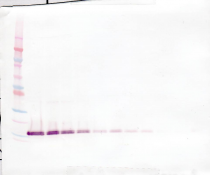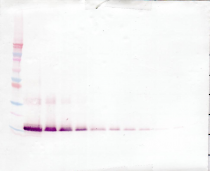ARG56817
anti-FGF acidic antibody (Biotin)
anti-FGF acidic antibody (Biotin) for ELISA,Western blot and Human,Mouse
Overview
| Product Description | Biotin-conjugated Rabbit Polyclonal antibody recognizes FGF acidic |
|---|---|
| Tested Reactivity | Hu, Ms |
| Tested Application | ELISA, WB |
| Host | Rabbit |
| Clonality | Polyclonal |
| Isotype | IgG |
| Target Name | FGF acidic |
| Antigen Species | Human |
| Immunogen | E.coli derived Recombinant Human FGF acidic. (MFNLPPGNYK KPKLLYCSNG GHFLRILPDG TVDGTRDRSD QHIQLQLSAE SVGEVYIKST ETGQYLAMDT DGLLYGSQTP NEECLFLERL EENHYNTYIS KKHAEKNWFV GLKKNGSCKR GPRTHYGQKA ILFLPLPVSS D) |
| Conjugation | Biotin |
| Alternate Names | HBGF1; FGF-1; FGF-alpha; GLIO703; ECGFA; ECGFB; ECGF; Endothelial cell growth factor; FGFA; Acidic fibroblast growth factor; Heparin-binding growth factor 1; Fibroblast growth factor 1; HBGF-1; AFGF; aFGF; ECGF-beta |
Application Instructions
| Application Suggestion |
|
||||||
|---|---|---|---|---|---|---|---|
| Application Note | * The dilutions indicate recommended starting dilutions and the optimal dilutions or concentrations should be determined by the scientist. |
Properties
| Form | Liquid |
|---|---|
| Purification | Purified by affinity chromatography. |
| Buffer | PBS (pH 7.2) |
| Concentration | 1 mg/ml |
| Storage Instruction | Aliquot and store in the dark at 2-8°C. Keep protected from prolonged exposure to light. Avoid repeated freeze/thaw cycles. Suggest spin the vial prior to opening. The antibody solution should be gently mixed before use. |
| Note | For laboratory research only, not for drug, diagnostic or other use. |
Bioinformation
| Database Links | |
|---|---|
| Gene Symbol | FGF1 |
| Gene Full Name | fibroblast growth factor 1 (acidic) |
| Background | The protein encoded by this gene is a member of the fibroblast growth factor (FGF) family. FGF family members possess broad mitogenic and cell survival activities, and are involved in a variety of biological processes, including embryonic development, cell growth, morphogenesis, tissue repair, tumor growth and invasion. This protein functions as a modifier of endothelial cell migration and proliferation, as well as an angiogenic factor. It acts as a mitogen for a variety of mesoderm- and neuroectoderm-derived cells in vitro, thus is thought to be involved in organogenesis. Multiple alternatively spliced variants encoding different isoforms have been described. [provided by RefSeq, Jan 2009] |
| Function | Plays an important role in the regulation of cell survival, cell division, angiogenesis, cell differentiation and cell migration. Functions as potent mitogen in vitro. [UniProt] |
| Calculated MW | 17 kDa |
| PTM | In the nucleus, phosphorylated by PKC/PRKCD. |
Images (4) Click the Picture to Zoom In
-
ARG56817 anti-FGF acidic antibody (Biotin) WB image
Western blot: 250 - 0.24 ng of Human FGF-acidic stained with ARG56817 anti-FGF acidic antibody (Biotin), under reducing conditions.
-
ARG56817 anti-FGF acidic antibody (Biotin) standard curve image
Direct ELISA: ARG56817 anti-FGF acidic antibody (Biotin) at 0.25 - 1.0 µg/ml results of a typical standard run with optical density.
-
ARG56817 anti-FGF acidic antibody (Biotin) WB image
Western blot: 250 - 0.24 ng of Human FGF-acidic stained with ARG56817 anti-FGF acidic antibody (Biotin), under non-reducing conditions.
-
ARG56817 anti-FGF acidic antibody (Biotin) standard curve image
Sandwich ELISA: ARG56817 anti-FGF acidic antibody (Biotin) as a detection antibody at 0.25 - 1.0 µg/ml combined with ARG56708 anti-FGF acidic antibody as a capture antibody. Results of a typical standard run with optical density.









